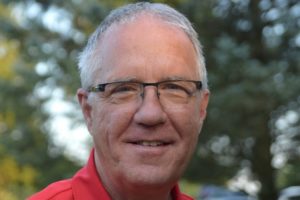 Ruben Chupp retired from full-time pastoral ministry after 28 years and now serves as an on-call chaplain at Goshen (Indiana) Health. He offers spiritual direction and works at two local funeral homes, as needed. He attends Sunnyside Mennonite Church in Dunlap, Indiana.
Ruben Chupp retired from full-time pastoral ministry after 28 years and now serves as an on-call chaplain at Goshen (Indiana) Health. He offers spiritual direction and works at two local funeral homes, as needed. He attends Sunnyside Mennonite Church in Dunlap, Indiana.
I like silence. More as I get older. It helps me think, clearing out the cognitive cobwebs and emotional rubble. Silence makes life resonate. But just because I have a strong sense that silence is good for me doesn’t make it any easier to commit to it, find it, make time for it.
Abbot Moses wrote, “Go sit in thy cell, and thy cell shall teach thee all things.” My “cell” measures nine by ten, 90 square feet of venerable and sometimes sacred space. My books are here. There is ample horizontal space for IT hardware: a laptop, a small DVD player and CD player. This room is my space. Here I can effectuate aggravating racket or contemplative stillness. Both inform my determinations, convictions and disposition.
“Noise” is a word adapted from the French word “nausea.” Noise is easy. It just happens, thoughtlessly, makes its own decisions, disrupts and distorts with no consideration. (Rats raised in noise become nervous wrecks, with all manner of collateral health issues.)
When it comes to noise, how does one tell the necessary from the unnecessary? Contemporary culture, plugged into technological racket, merrily diminishes hearing, emotional intelligence and creative ruminations. The world is starved for silence but doesn’t know it, seduced by the comfortable, shallow distraction of cacophony.
Christopher Knight lived in the Maine woods for 27 years without uttering a single word. To avoid detection, he never lit open fires. The moon was his minute hand, the seasons the hour hand. Knight’s reason for entering the forest: “I wasn’t content.” Before he exited the world, he was shy, socially inept, anxious. After, he says, “I was lord of the woods.”
The wilderness granted him freedom, privacy and serenity. And it transformed his brain. He developed photographic recall, a proclivity for deep contemplation, a limitless attention span. (Nathaniel Rich, Lessons of the Hermit, The Atlantic, April 2017).
Jesus was a celebrity, a rock star, a movie star, the disciples his entourage, planning to ride his popularity and status to the presidency and White House. Crowds pressed in on Jesus, clamoring for another miracle, a touch from his hand. His fame was rising, entrancing the common people, who anticipated that maybe this was the one, the Messiah who would usurp the lousy Romans and erect God’s Kingdom. The disciples did nothing to dissuade the masses from their notions.
But Jesus had other ideas, another way of being in the world. Without being fanatical or extreme, like Knight, Jesus displayed an affection for seclusion: “But now more than ever the word about Jesus spread abroad; many crowds would gather to hear him and to be cured of their diseases. But he would withdraw to deserted places and pray” (Luke 5:15-16).
Everyone was searching for Jesus, including the disciples. They found Jesus practicing solitude, seeking God. “In the morning, while it was still very dark, he got up and went out to a deserted place, and there he prayed. And Simon and his companions hunted for him” (Mark 1: 35-36).
When the multitude clamored for a miracle, a sign or another free lunch, Jesus was prone to escape to nature: mountains, sea, wild places to pray, the outdoors his prayer closet and quieting companion. There he touched the face of God and was reanimated, revived by the grace and wisdom communicated by the Holy Spirit.
While it is true that expanding and invigorating one’s faith requires companions who will utter the truth to us, silence is a second imperative. For the follower of Jesus, spiritual balance is called for. It is human nature to ponder the existential question, “Who am I?” To that inquiry, Merton responded, “I am the one loved by Christ.” The reach for divine affection, the deep mortal longing for unremitting welcome, “will never be satisfied until we confront and accept our solitude” (Brennan Manning, Abba’s Child). In seclusion we discover the truth about ourselves, and the truth that human belovedness rests in “God’s relentless tenderness for us revealed in Jesus Christ” (Manning).
I like sitting in silence, especially in darkness, visual and aural senses deprived of stimulation. There I am alone, turning inward, employing spiritual senses to seek the visage and voice of Jesus. When my mind bends to reasoning, and emotions become diversion, I circle back to Scripture: the Lord’s Prayer, Isaiah 43:1-3, Psalm 23, Romans 8:31-39, Jeremiah 29:11.
But my signature verse for silence utilizes only eight words: “Be still and know that I am God.” I frequently breathe this text in and out in two-word intervals, sometimes only one word. It is a hard thing to achieve silence, the monkey mind flitting from one thing to the next. But the attempt must be made, successful or not, for it is in the trying that I storehouse silence — for those times when the discord and tumult of life press in on me. I draw on that bank which empowers me to breathe deep, listen closely, watch intently for the presence and directives of Jesus.
_____________________________________________________________________
Mennonite Spiritual Directors Network is an association of spiritual directors across MC USA who periodically gather for times of retreat, learning and connecting with each other.

